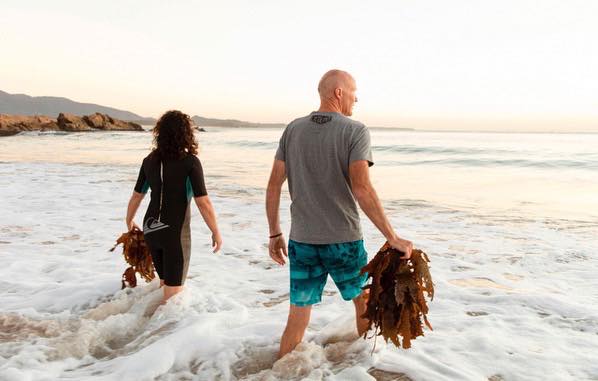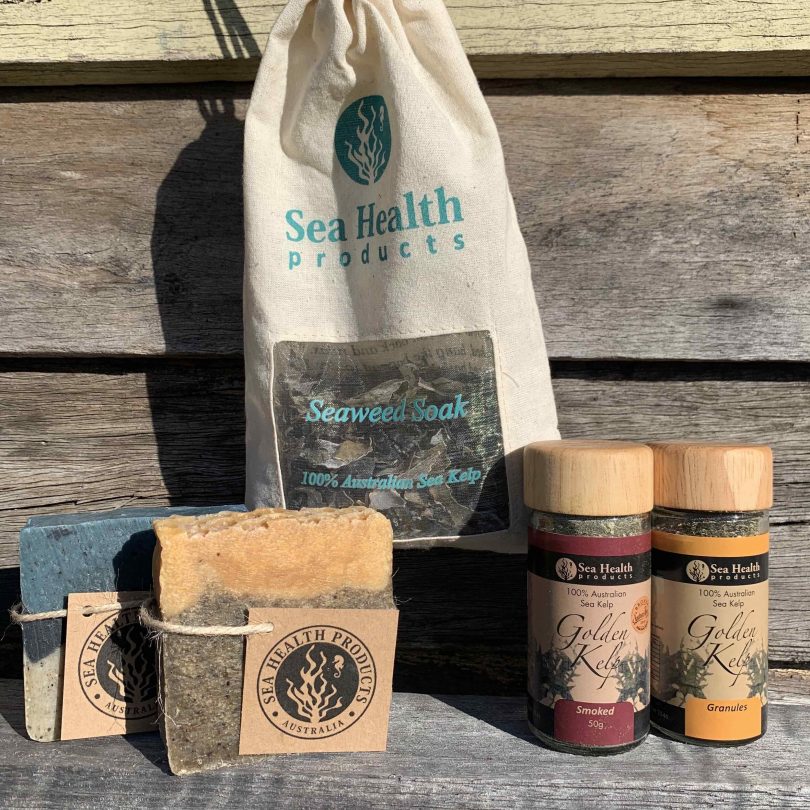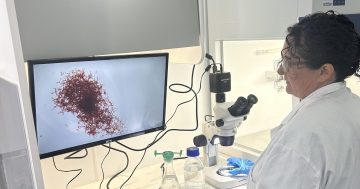
Kelp harvesting is done between tides but Jo Lane, (pictured above with her husband Warren Atkins) from Sea Health, has a better idea. Image: Honey Atkinson
There’s a long history of harvesting kelp manually on the NSW South Coast – a tradition started by Betty Long in 1970.
As owner of the business Sea Health, Betty earned the title of “The Kelp Lady”.
Betty sold the business to Jo Lane in 2015, and it now looks set to pioneer a sustainable kelp farming industry on the NSW South Coast.
Ms Lane was awarded a Churchill Fellowship and undertook a study tour of kelp farms around the world, where kelp is grown in the ocean attached to ropes, and harvested once every six months. The kelp farms naturally reproduce, growing kelp forests in the ocean. They provide an excellent carbon sink and have been shown in Tasmanian research trials to keep water clean naturally in fish farming.
Kelp can be used in a variety of products, Ms Lane said, including animal feed, seasoning, food, as a sustainable biofuel, and an element in producing biodegradable plastics.
“We have an existing business collecting kelp from beaches between the tides,” Ms Lane said, “and I went to the Bega Valley Innovation Hub with the idea of cultivating kelp on a farm. I was part of the second cohort in the accelerator, and it taught me a great deal about business and networking.
“There is one kelp farm trial site in Tasmania. Up until last year, there were none.
“You collect ready to breed kelp, and you put it in a tank, and it grows baby kelps which you attach to string, then rope, then you put it in the ocean – and in five or six months time, you pull it in and harvest it,” she said.

A Sea Health gift pack, with a range of Kelp products. Image: Honey Atkinson.
“It can be used for food, cosmetics, medical applications, agricultural feed, fertiliser, biofuels, almost anything.
“There’s a type of kelp called Asparagopsis which the CSIRO discovered, when added to animal feed, stops cows burping,” she said.
Contrary to popular belief, ruminants such as cows burp (not pass wind) the methane equivalent of 3.1 gigatonnes of carbon dioxide into the atmosphere annually.
“There are Asparagopsis trials underway in Queensland and Tasmania, to see if the addition of the seaweed can reduce the global warming effect of livestock emitting methane,” Ms Lane said.
Kelp can only be farmed in cooler southern waters, and Sea Health is planning on beginning to farm Golden Kelp, a versatile ocean plant, under licence from all the relevant authorities. The industry has the potential to create 5000 jobs over the next five years on the NSW South Coast. The Seaweed Institute’s Jo Kelly authored a report which lays out the future of the Australian Seaweed Industry as a blueprint, for AgriFutures, which was released in August this year.
“Golden Kelp is a restorative crop, it doesn’t require any fertiliser, or land. It’s a great carbon sink. Some of the kelp will reproduce naturally and increase biodiversity in the area,” Ms Lane said.
Currently her bestselling product is Furikake, a Japanese rice seasoning that tastes amazing on rice, vegetables, noodles, seafood, tofu or any dish which needs some umami flavour. It contains Golden Kelp, black and white sesame seeds, nigella seeds, chilli, salt, and a dash of sugar.
You can shop online at the Sea Health website, and find out more about sustainable kelp farming.








